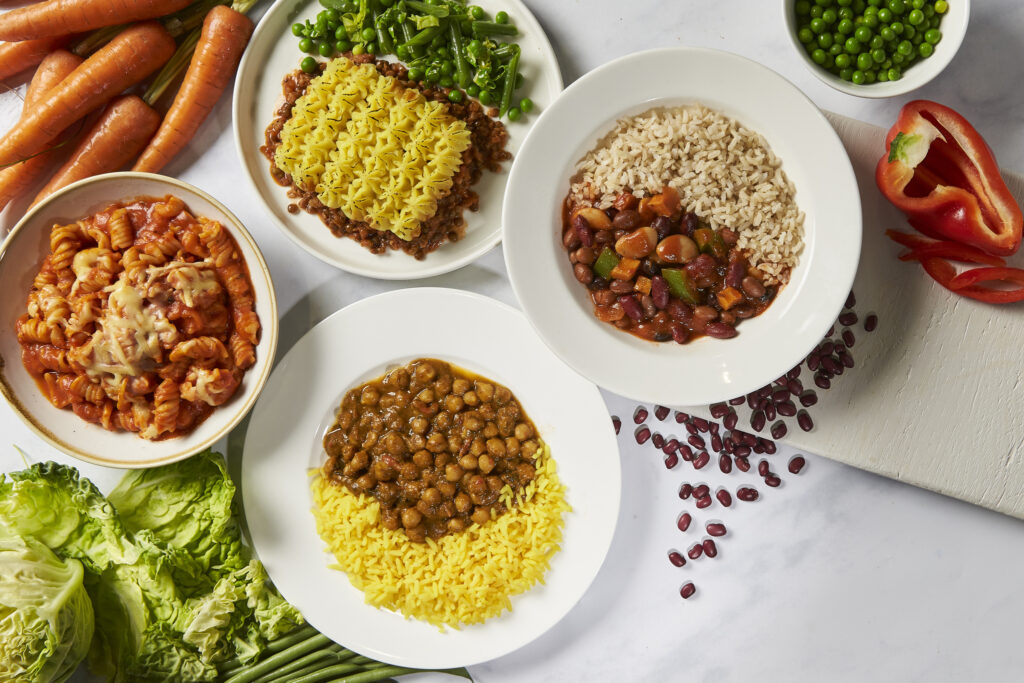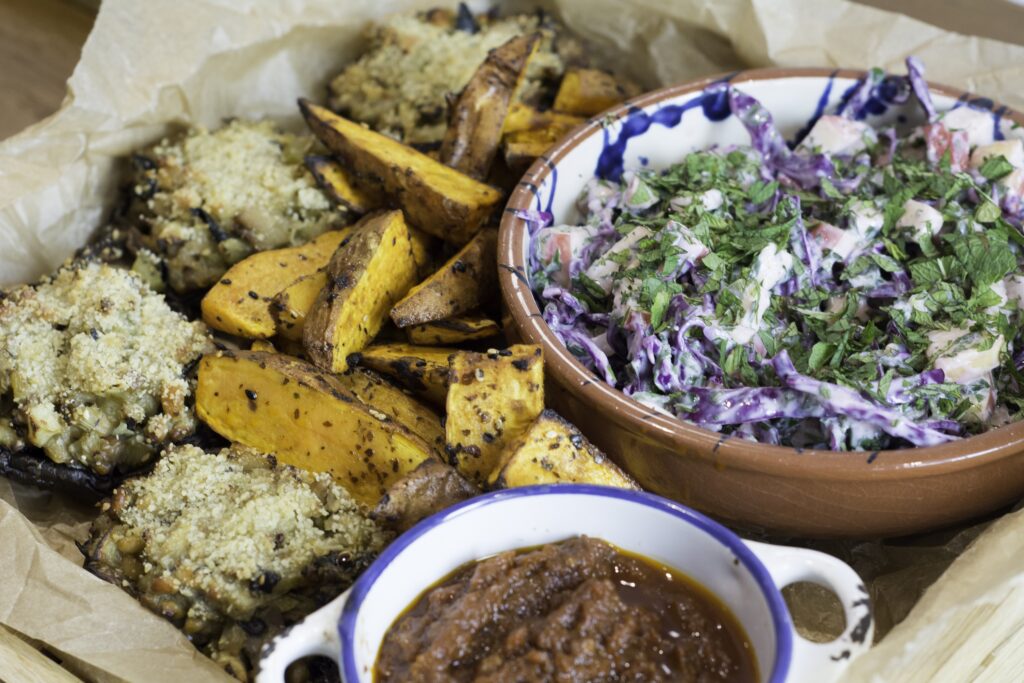
Compass Group is increasing the use of vegetables, beans and lentils amid its push to make 40% of its UK and Ireland menus plant-based, a goal that has led to healthier meals at its sites.
The world’s largest catering company’s bet on plants is paying off for public health.
In 2021, Compass Group committed to replacing 40% of its meat dishes in the UK and Ireland with plant-based proteins by the end of the decade. While sustainability was the prime motivator behind the move, it has led to a healthy food boom for the company.
This is thanks to greater use of vegetables and plant proteins like beans, lentils and pulses, as well as a reduction in fat, salt and sugar content in its dishes.
“I am incredibly proud of our progress,” said Nicky Martin, director of nutrition at Compass Group UK & Ireland. “We continue to keep levels of fat, sugar and salt low. Our focus on plant-based and plant-forward dishes has resulted in creative and delicious dishes for our customers alongside an increase in veg procurement and items like lentils.”
She added: “Our dedicated teams are continuing to look at how we can put health and wellbeing front and centre of meals and track sales for healthier, sustainable choices.”
Compass Group’s nutritionists updating recipes to add plant proteins

The healthy and sustainable makeover of its offerings delivers on Compass Group’s Wellbeing Promise, and is being achieved through a focus on providing nutrition information at the point of choice, recipe management, and working with its procurement arm, Foodbuy Group, to increase the procurement of vegetables and the use of legumes.
The company has begun tracking and reporting on the use of beans, legumes and pulses on its menus, ordering 29,000 tonnes in 2024. In addition, it has increased its vegetable procurement by 8% over the last 12 months, surpassing 12,000 tonnes and leading to 120 million portions of vegetables being served to children. This has put Compass Group on track to achieve its target of a 20% hike in vegetables by 2030.
Moreover, the foodservice giant said it has placed “particular emphasis” on ramping up the number of plant-based dishes. An analysis of over 70,000 products showed that 17% would be classified as a source of or high in plant protein, and 23% the same for animal protein. Using this data, Compass Group’s nutritionists are continuing to update recipes to add plant proteins each month.
As for the reduction of foods high in fat, salt or sugar – a key priority of the UK government too – nearly 88% of the 21,000 analysed recipes have low or medium levels of fat, rising to 93% for salt and 94% for sugar. It worked with plant-based giant Flora Food Group to deliver an annual reduction of 2,700 kg of salt.
“Good nutrition is an essential component of a healthy lifestyle and food services companies can play a vital role in improving the health of the nation,” said Dr Paul Litchfield, independent chief medical advisor to Compass Group.
“The team at Compass takes an evidence-based approach to producing appetising menus, which reduce potentially harmful ingredients, like salt and sugar, and increase consumption of plant-based protein,” he added.
How Compass Group is embracing plants across sectors

Expanding on how its nutritionists and dietitians are introducing healthier swaps to meals, Compass Group noted that its healthier range, The Good Stuff, is embedded in over 50% of food concepts in the business and industry sector. This means recipes that either contain a whole grain or at least two portions of vegetables, and no meals high in saturated fat, sugar or salt.
Its school catering arm, Chartwells, is increasing meat-free options with every seasonal menu change. And all the dessert options by its defence and government services brand ESS are vegetarian or plant-based, while all breakfast smoothies are vegan.
At the Wellspring restaurant owned by Medirest, Compass Group’s medical sector subsidiary, it is reducing red meat dishes and adding vegetables and plant-based proteins. The caterer’s wellness team has also hosted over 60 pop-up events to highlight the plant-forward philosophy of its Ways to Be Well initiative, the latest of which was a plant-powered BBQ cook-along.
Additionally, Compass Group is weighing in on the discourse around ultra-processed food (UPF). Nutritionists at Levy, its sports and events hospitality arm, are looking at how they can reduce the amount of UPFs available. The team has identified 50 UPFs that feature on its menus, and is seeking to reduce or remove them where possible.
“Diet continues to be a real challenge for so many, but our teams are committed to our continued work in this area. We are passionate about providing balanced nutrition to help prevent malnutrition, obesity, and diet-related disease,” said Martin.
As an extension of its sustainability initiatives, Compass Group is working with FareShare, Olio and Too Good to Go to redistribute surplus food to communities in need, boosting nutrition security and tackling waste.
The meat and dairy industry accounts for nearly 60% of the food system’s emissions, with an outsized impact on water use and land use, despite providing less than a fifth of the world’s calories and only 37% of its protein. Moreover, animal protein consumption is linked to a host of chronic conditions, with leading nutritionists and government dietary guidelines calling for a shift to plant-based eating.
Initiatives that make more plant-based options available and accessible make it easier for consumers to adopt meat-free eating. It is one of the most effective ways for foodservice operators to promote dietary shifts, according to the World Resources Institute.
Compass Group isn’t the only one with a meat-free sales target. Rival Sodexo has pledged to make a third of its menu plant-based by this year, and Accor Group, which owns the Novotel, Raffles, Pullman, Sofitel, Fairmont and Ibis brands, is looking to turn half its food offerings vegan by 2030.
The post Plant-Based Push Helps World’s Largest Caterer Serve Up Healthier Food appeared first on Green Queen.
This post was originally published on Green Queen.